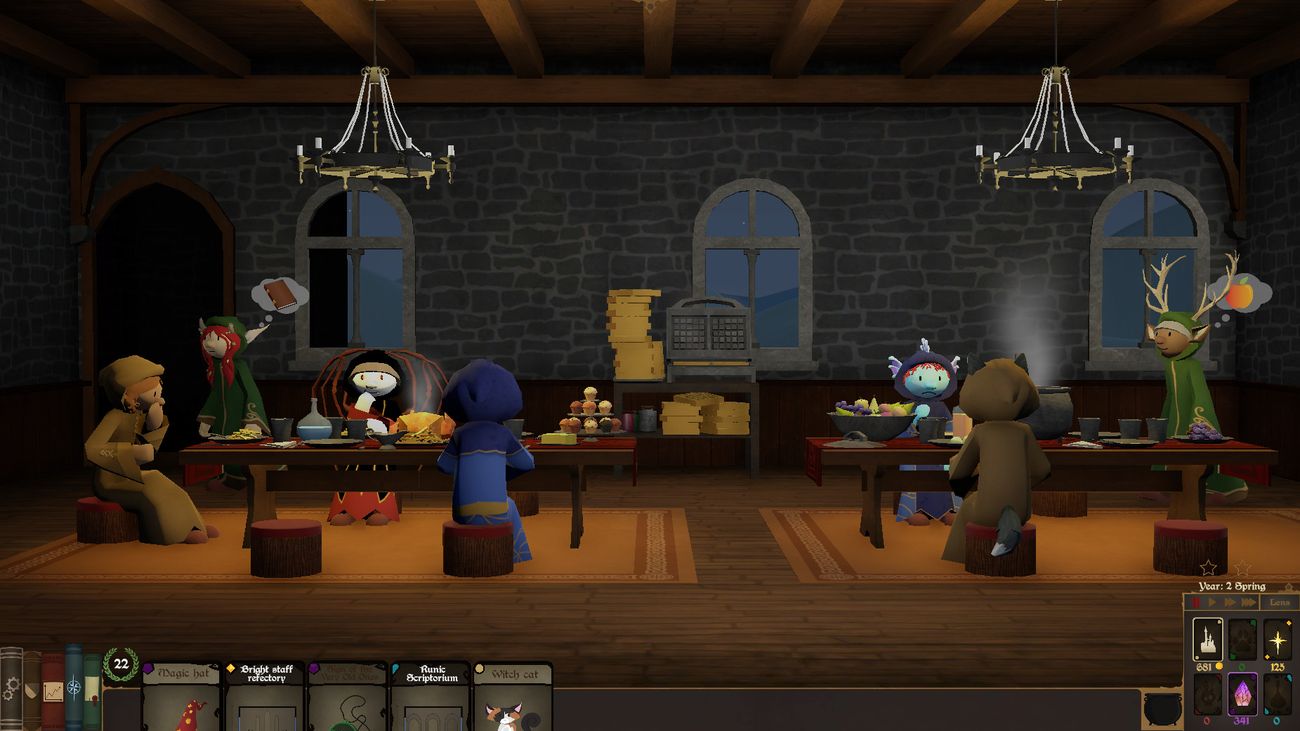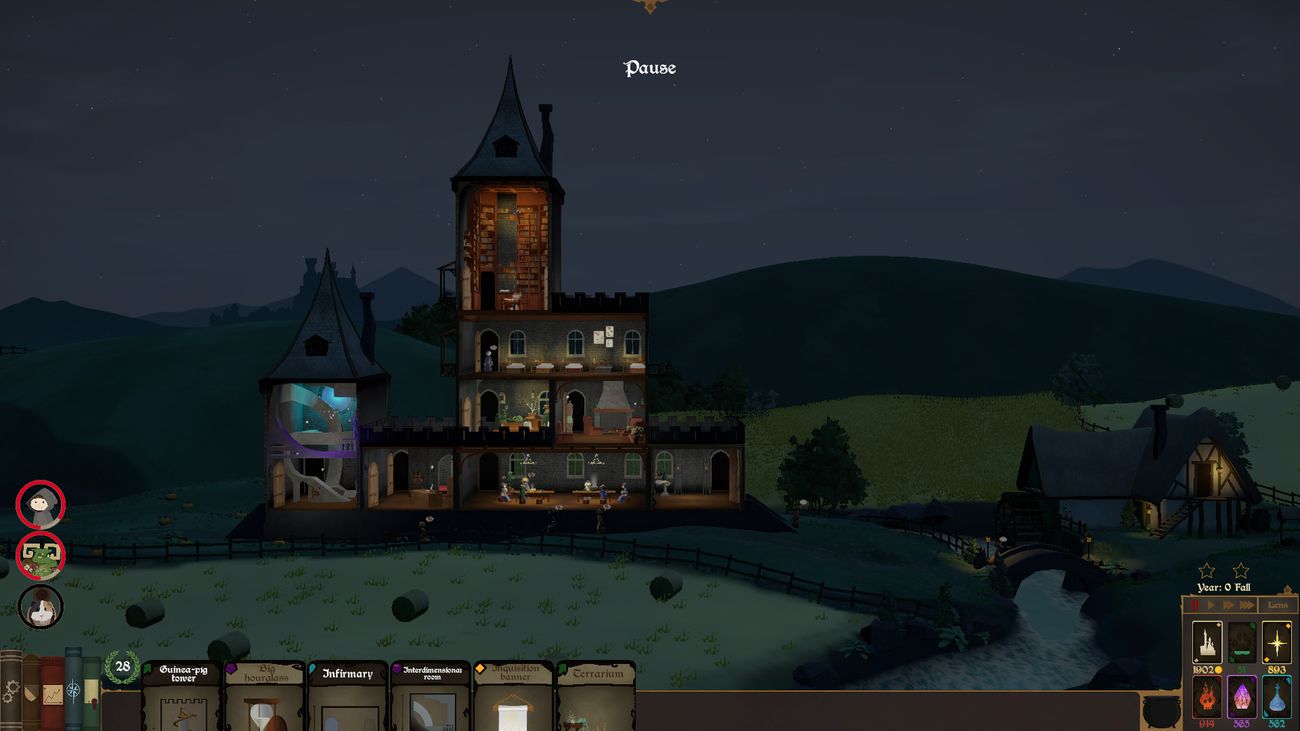Spellcaster University – -apkrig
You will spend the next time building a witch’s university on the back of a floating turtle and completing quests whose system you will be familiar enough with during the previous game. As a result, you have the game time of higher units of hours ahead of you, which makes Spellcaster University a great afternoon-night game, in which you are happy to start again almost immediately after the first finish.
I’m not kidding. It’s really such a catchy experience that I not only didn’t sleep because of it, but also started playing repeatedly at the same time I finished the campaign. And it really doesn’t happen to me very often.
Contents
Wise hat
Immediately after the creation of the coat of arms, you will embark on the first timid steps on the path to magical perfection. The game combines card unloading, generating different types of mana, and maintaining a reputation with factions scattered around the rest of the world – it’s a shame that ninety percent of them are the same on every map, but the rest can pleasantly diversify the overall gameplay.
But before you can start and strengthen relationships, you have to start building the university itself. For this purpose, you usually have the most basic “wings” available – a banquet hall, a dormitory and possibly others that you get during the game. At the same time, you can start accepting the first students and set up the first dormitories for them. You will cut the role of the Potter’s Wise Hat yourself and divide the students according to your own sympathies and antipathies, or according to much more effective keys.
Each dormitory you set up has two passive perks available to improve students’ abilities. Some colleges will be able to manage a selected area of magic more effectively, while others boast more general benefits such as greater motivation to learn as such or resistance to hunger.
Each student is defined by qualities divided into three categories – intelligence, financial background and inclination to good or evil, following the example of the Dragon’s Lair. They also have specific predispositions that may correspond to the dormitory to which you assign the student (which is desirable), but they also do not have to.
The boxes will move according to your own university and university settings, and you can, of course, choose whether you will accept the student to study at all. Does it make sense to take a fool with great financial resources, or do you invest out of your own pocket in a poor genius? And do you have enough space for their accommodation? Will they not suffer from hunger? What types of lunches will you offer students?
Up to such details, it is necessary to consider recruiting students and managing your own finances. And you, pretty much please, haven’t even accepted any teachers yet!

Can’t you hear the resistance talk?
As you expand your university with basic living and dining areas, it’s time to start thinking about the format of education itself. Fortunately, distance learning through Zoom is not a threat, but you have to choose between five learning disciplines. We have an obligatory division into the magic of Light and Shadow, accompanied by the pair Nature and Arcana, and the last to the Holy Five is Alchemy. All of these are then divided into three other sub-disciplines – for example, students of natural sciences reach for botany, care for magical creatures or druidism.
You can specialize individual dormitories in a specific field or a combination of them, and thus educate arcidruids or paladins, liches and the like. But before students reach the graduation phase, they need to be provided with quality teachers.
The moment you build a new classroom for the points earned (or money), you will automatically hire a new professor. There are usually two to choose from, with the same attributes as students. Some are boring, others are old and slow, and it takes them a long time to move from teaching to teaching. However, they have a threefold feature – intelligence, approval and the integration of themselves into witchcraft unions. All this affects both the quality of teaching and the amount of money you will invest in such a professor.
As a result, you want to achieve the optimal price-performance ratio and send the right students to the right students within the individual dormitories. If you succeed, you will benefit from it – graduates increase the prestige of the university and at the same time usually offer some immediate graduation effect, such as mana from a field of study, a passive bonus to the education of future generations and the like.

No one is expecting a magic inquisition!
As your universities grow, so do your neighbors: farmers, the king, orcs, adventurers, the Inquisition, or the undead themselves. After all, some random event caused by one of the factions, which can result in either a profit or a penalty, depending on your choice, will break your management plans.
But to make matters worse, some answers require certain predispositions, so you can soothe an Inquisition about to turn you around by having a specific building acquired for the magic of Light. You will indicate to the fanatics that you are actually good on their side.
Farmers are dying of cows, what about that? You can heal them with alchemy, druidism, or sacrifice them to the dark forces, each with a different effect on your relationships and mana reserves for further expansion of the university. And since it would be unfair to leave everything to chance, you have the opportunity to send your special messengers to the individual factions – guinea pigs. Spellcaster University is not taken at all and it’s very good, because it adds the right flavor to the game, thanks to which generic micromanagement becomes fun on all levels.
And that’s how you live here. You build universities, maintain relationships, train magicians, complete quests, and wait for a time limit to end, ending each map with the arrival of undead units. However, you, as motivated educators, do not give up and continue one region further, only to get to a turtle encounter sooner or later.
The icing on the cake is the opportunity to go on an expedition with your students during the individual episodes. Good relationships with the guild of adventurers help, but in practice you are on your own. You progress through the floors of a selected dungeon with four students, fight, play cards and gain valuable resources to improve the academy. The game would do without this mode, but at the same time its playing does not fall out of the overall concept.

The magic of the unexpected
Spellcaster University is simply a great game. It fulfills everything I expected from it, and although it won’t win an award for graphics or be remembered as a groundbreaking title within the genre of building strategies, it’s just fun.
You need to learn to adapt the academy building plan to unexpected twists and turns. You have to learn to be a skilful diplomat who professes the theory of “the wolf will eat and the goat will stay whole.” At the same time, you will enthusiastically decide the fates of more or less gifted students and watch how the restless ones end up in your ornate prison to learn good manners.
I could complain about the shorter length, the need to often zoom into a sprawling university to do small tasks and the like, but it’s just small freckles on the beauty of the game that will definitely excite strategists and builders. Most of the time it’s a really magical experience.



